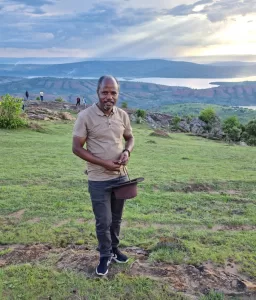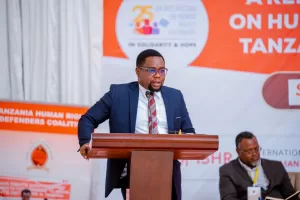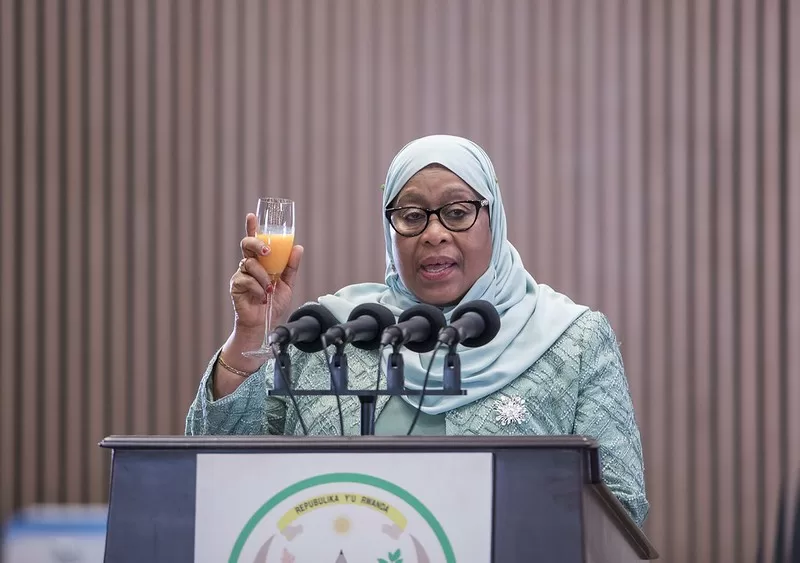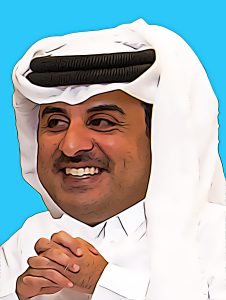The Magufuli hangover
When Tanzania’s President John Magufuli died in 2021, at the height of the Covid-19 pandemic, many hoped for an end to his six years of autocratic rule which saw the country’s civic space all but disappear. After Samia Hassan succeeded him, she assured the country that his authoritarian practices had died with him. Yet a crackdown on opposition to a lucrative new deal to run Dar es Salaam’s port in perpetuity and restrictions on the use of virtual private networks (VPNs) suggests otherwise.
In her inaugural policy speech after Magufuli’s death, President Hassan said: “I have heard there are media that were banned. Reopen them, we should not give them room to say we are shrinking press freedom. We should not ban the media by force. Reopen them, and we should ensure they follow the rules.”

Tanzanian journalist Ansbert Ngurumo fled to Sweden in 2017
One of those who heard Hassan’s promises was the Tanzanian journalist Ansbert Ngurumo (left), who had fled Tanzania in 2017 after getting tipped off that hitmen with orders from Magufuli to kill him had checked into the hotel where he was staying.
Speaking to Index from exile in Sweden, he said: “Journalism became a crime under Magufuli”
The omens looked good after Magufuli’s death. After being sworn into office, President Hassan, the newly celebrated “champion” of freedom of expression, seemed to act promptly on her promises. Human rights organisations, who had had their bank accounts frozen, were once again able to regain access. Onesmo Olengurumwa, director of the Human Rights Defenders Coalition of Tanzania, saw the accounts of his organisation released shortly after her announcement.
Media Council Tanzania reported a decrease in cases of arrests and harassment against journalists. It recorded 18 violations in 2022, down from 25 in 2021 and 41 in 2020. In January 2023, Hassan lifted a ban on opposition party rallies.
Yet Ngurumo says Hassan’s speech was disingenuous. “She was insisting that she was the champion of freedom of expression and free speech, whilst in the same breath putting barriers and limits to those same freedoms. Her freedom of expression is ’you scratch my back, I’ll scratch yours’ That is not freedom of expression.”
The early optimism which followed Hassan’s rise to power was short-lived. Although the number of reported cases against journalists has decreased since Magufuli’s death, suspensions, arrests, and harassment remain commonplace.
In fact, the ghost of Magufuli still hangs over civic space in Tanzania and journalists still feel the weight of the legislation passed and enforced during Magufuli’s presidency. Laws like the 2015 Cybercrimes Act, the 2016 Media Act, and the 2018 Online Content Regulations continue to restrict freedom of expression, and create an environment of fear and self-censorship.
According to Ngurumo, “Magufuli had instilled a sense of brutality in the state organs. That spirit of brutality didn’t die with him.”
More recently, Tanzanian authorities have arrested over 20 activists protesting the most recent deal to manage Dar Es Salaam’s largest port, according to Human Rights Watch. The authorities later arrested three lawyers for holding press conferences on the port deal. Boniface Mwabukusi, Willibrod Slaa and Mdude Nyagali were held on allegations of treason before being released four days later.
The controversial deal will see Dubai Port World, a UAE-based logistics company, take over the management of Tanzania’s largest port in Dar Es Salaam. Critics are concerned by the nature of the deal, which sees DP World gain the right to manage the ports in perpetuity, whilst restricting Tanzania’s ability to change conditions of the contract.
Opposition to the DP deal has been stamped out of Tanzanian media. This most recent crackdown puts Hassan’s promises in a questionable light. Old authoritarian practices have quickly come back to haunt Tanzania at the first real threat to Hassan’s leadership.
For Ngurumo, this was just another sinister message to journalists and activists in Tanzania: “These guys were held but they were released. You see, they are just threats to remind them that the government can still do something.”
Those threats seem to be working. Under constant fear and pressure, mainstream Tanzanian media still shies away from criticising the government.

Onesmo Olengurumwa of the Human Rights Defenders Coalition of Tanzania feels that opponents to a deal for Dubai Ports World to take over Dar Es Salaam’s port fear speaking out
Olengurumwa (right) argues that publications “have that hangover and feel like they will be treated as they were under Magufuli if they speak up. So they choose to remain silent, especially the mainstream media”.
From Sweden, Ngurumo still regularly writes about Tanzanian politics in his online newspaper Sauti Kubwa which means “loud voice” in Swahili. He knows that his colleagues in the country do not have the luxury of distance.
“Right now, I don’t see media in Tanzania doing their job. I do not blame them because the laws are still very repressive.”
Ngurumo still believes there is a way out: “If one thing should be done it should be amending the existing laws. We are only afraid of the laws. If we had the right laws, we would just do our job.”
Tanzania’s civic space might be at the mercy of the fickle “goodwill” of their new President, but human rights activists like Ngurumo and Olengurumwa are working hard to restore freedom of expression in their country.
Ngurumo still advocates for engagement with the government from exile. “There is back and forth. We don’t want to have to wait until there is another president.”
In their eyes, change can only happen through engagement with the government and community empowerment. Both are part of organisations pushing for the amendment of the Magufuli laws. Olengurumwa added that “if people can see that our constitution is changing and that laws are being revised, then that will also give them the confidence in our civic space.”
Their fight to reclaim civic space after decades of authoritarianism will be hard fought. On 13 October 2023, the Tanzanian Communication Regulatory Authority issued a statement restricting the use of virtual private networks in the country, much to the dismay of human rights organisations.
In their statement, the Tanzania Digital Rights Coalition condemned the move and argued that it corresponded to “curbing freedom of expression and restricting access to unbiased information.”
It seems authoritarian habits die hard. But if President Hassan is serious about her intentions to restore civic space in Tanzania, it is only by breaking down repressive legislation and building the protection of freedom of expression into the constitution that old ghosts can finally be laid to rest.

Tanzania’s president Samia Suluhu Hassan in 2021. Photo: Paul Kagame, CC BY-NC-ND 2.0 DEED

